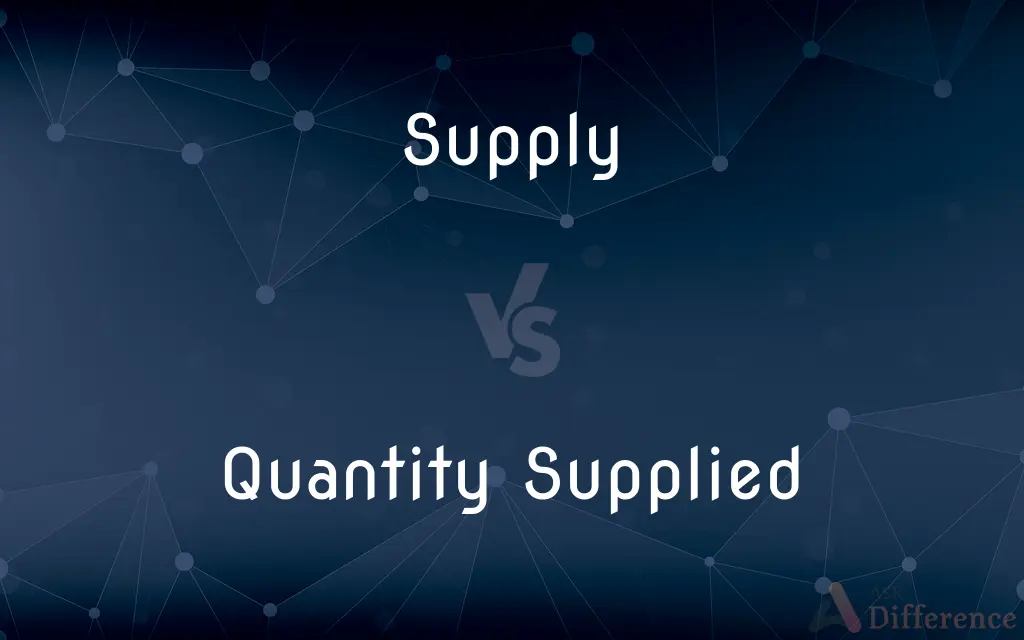Supply vs. Quantity Supplied — What's the Difference?
Edited by Tayyaba Rehman — By Fiza Rafique — Published on December 16, 2023
Supply refers to the entire range of quantities a seller is willing to produce at different prices, while Quantity Supplied is the specific amount a seller is willing to produce at a particular price.

Difference Between Supply and Quantity Supplied
Table of Contents
ADVERTISEMENT
Key Differences
Supply represents the holistic perspective of producers in terms of how much of a good they're willing to produce over a range of prices. It generally takes the form of a curve or line on a graph, showcasing the relationship between product prices and the amounts producers are willing to bring to the market. On the other hand, Quantity Supplied pinpoints a specific point on that curve, detailing how much of a product is provided at a singular, definite price.
The concept of Supply is broader and encompasses the entire behavior of producers. It's affected by various factors like production costs, technology, and expectations about the future. In contrast, Quantity Supplied is more narrow in its scope. It solely considers the amount of a good that sellers are prepared to sell at one specific price.
In the realm of economics, when discussing Supply, one often refers to the entire supply curve which visualizes how product quantities might change with fluctuating prices. However, when the conversation shifts to Quantity Supplied, the focus narrows down to one distinct quantity corresponding to a unique price.
It's crucial to understand that while changes in the price of a good can cause a movement along the supply curve (changing Quantity Supplied), other factors that influence producers can shift the entire supply curve. Thus, while Quantity Supplied changes denote a movement along the curve due to price changes, shifts in Supply signify a fundamental alteration in producer behavior, resulting in a new supply curve.
Comparison Chart
Definition
Refers to various quantities offered at different prices
Refers to a specific amount offered at a particular price
ADVERTISEMENT
Scope
Broader, considers all prices
Narrow, focuses on one price
Representation
Often visualized as a curve or line
Represented as a point on the supply curve
Influencing Factors
Production costs, technology, future expectations, etc.
Primarily influenced by price
Reaction to Price Changes
Causes movement along the curve
Results in change in quantity without shifting the curve
Compare with Definitions
Supply
The relation between product price and quantity available.
The Supply of organic produce rises as consumer demand grows.
Quantity Supplied
The amount of a good sellers provide at a specific price.
The Quantity Supplied of bread daily at the local bakery is 200 loaves at $2 each.
Supply
A representation of producer behavior across price ranges.
The global Supply of oil fluctuates based on geopolitical events.
Quantity Supplied
A single point on the supply curve.
When the price of gold rises, the Quantity Supplied also tends to increase.
Supply
To make available for use; provide
Does the hotel supply towels?.
Quantity Supplied
The tangible output by producers at a particular price level.
With rising demand, the Quantity Supplied of handmade masks multiplied.
Supply
To provide something necessary or desired to; furnish or equip
Supplied the players with uniforms.
Quantity Supplied
The response of sellers to a singular price.
When coffee beans' prices surged, the Quantity Supplied by local farmers increased.
Supply
To have as a necessary or desirable feature
A crime scene that supplied valuable evidence.
Quantity Supplied
The exact number of items offered at a set price.
At $10 per unit, the Quantity Supplied of the new toy was 500 units.
Supply
To fill sufficiently; satisfy
Supply a need.
Supply
To make up for (a deficiency, for example); compensate for.
Supply
The act of supplying
Funds for the supply of the expedition.
Supply
An amount available or sufficient for a given use; stock
Our supply of milk is low.
Supply
Often supplies Materials or provisions stored and dispensed when needed.
Supply
(Economics) The amount of a commodity available for meeting a demand or for purchase at a given price.
Supply
(transitive) To provide (something), to make (something) available for use.
To supply money for the war
Supply
(transitive) To furnish or equip with.
To supply a furnace with fuel; to supply soldiers with ammunition
Supply
(transitive) To fill up, or keep full.
Rivers are supplied by smaller streams.
Supply
(transitive) To compensate for, or make up a deficiency of.
Supply
(transitive) To serve instead of; to take the place of.
Supply
(intransitive) To act as a substitute.
Supply
(transitive) To fill temporarily; to serve as substitute for another in, as a vacant place or office; to occupy; to have possession of.
To supply a pulpit
Supply
(uncountable) The act of supplying.
Supply and demand
Supply
(countable) An amount of something supplied.
A supply of good drinking water is essential.
She said, "China has always had a freshwater supply problem with 20 percent of the world’s population but only 7 percent of its freshwater". File:She said, “China has always had a freshwater supply problem.ogg
Supply
(in the plural) Provisions.
Supply
An amount of money provided, as by Parliament or Congress, to meet the annual national expenditures.
To vote supplies
Supply
Somebody, such as a teacher or clergyman, who temporarily fills the place of another; a substitute.
Supply
Supplely: in a supple manner, with suppleness.
Supply
To fill up, or keep full; to furnish with what is wanted; to afford, or furnish with, a sufficiency; as, rivers are supplied by smaller streams; an aqueduct supplies an artificial lake; - often followed by with before the thing furnished; as, to supply a furnace with fuel; to supply soldiers with ammunition.
Supply
To serve instead of; to take the place of.
Burning ships the banished sun supply.
The sun was set, and Vesper, to supplyHis absent beams, had lighted up the sky.
Supply
To fill temporarily; to serve as substitute for another in, as a vacant place or office; to occupy; to have possession of; as, to supply a pulpit.
Supply
To give; to bring or furnish; to provide; as, to supply money for the war.
Supply
The act of supplying; supplial.
Supply
That which supplies a want; sufficiency of things for use or want.
Supply
Auxiliary troops or reënforcements.
Supply
The food, and the like, which meets the daily necessities of an army or other large body of men; store; - used chiefly in the plural; as, the army was discontented for lack of supplies.
Supply
An amount of money provided, as by Parliament or Congress, to meet the annual national expenditures; generally in the plural; as, to vote supplies.
Supply
A person who fills a place for a time; one who supplies the place of another; a substitute; esp., a clergyman who supplies a vacant pulpit.
Supply
Serving to contain, deliver, or regulate a supply of anything; as, a supply tank or valve.
Supply
An amount of something available for use
Supply
Offering goods and services for sale
Supply
The activity of supplying or providing something
Supply
Provide or furnish with;
We provided the room with an electrical heater
Supply
Circulate or distribute or equip with;
Issue a new uniform to the children
Supply blankets for the beds
Supply
Provide what is desired or needed, especially support, food or sustenance;
The hostess provided lunch for all the guests
Supply
State or say further;
`It doesn't matter,' he supplied
Supply
The total amount of a product or service available for purchase.
The Supply of smartphones in the market has increased this year.
Supply
The willingness and ability of producers to offer goods.
Due to technological advancements, the Supply of electric cars has surged.
Supply
The aggregate of products offered at every possible price level.
The Supply curve for luxury goods is often steep, indicating limited availability.
Common Curiosities
What does a change in Quantity Supplied indicate on a supply curve?
A change in Quantity Supplied indicates a movement along the existing supply curve.
What primarily influences Quantity Supplied?
Quantity Supplied is primarily influenced by the product's price.
How does Supply differ from Quantity Supplied?
Supply represents quantities offered across various prices, while Quantity Supplied is the specific amount offered at one price.
How is the concept of Supply depicted on a graph?
Supply is depicted as a curve or line on a graph, showcasing the relationship between product prices and quantities.
Can future expectations of producers affect Supply?
Yes, if producers expect higher future prices, they might decrease current Supply to sell more in the future.
How does Quantity Supplied react to a sudden price drop?
Generally, a price drop reduces the Quantity Supplied as sellers are less willing to offer goods at lower prices.
Is Quantity Supplied only about tangible goods?
No, Quantity Supplied can also refer to services provided at a specific price.
What’s the importance of differentiating between Supply and Quantity Supplied?
Differentiating ensures clarity in discussions, especially in economic analyses, as they represent different concepts.
Can changes in technology affect Supply?
Yes, technological advancements can increase production efficiency and thus affect overall Supply.
What factors can shift the entire Supply curve?
Factors like production costs, technological changes, and future expectations can shift the entire Supply curve.
Can government regulations affect Supply?
Yes, regulations can influence production costs and procedures, impacting overall Supply.
Does a rise in price always increase Quantity Supplied?
Typically, a rise in price leads to an increase in Quantity Supplied, but it depends on the elasticity of the supply.
Why might a seller decrease the Quantity Supplied even if prices are rising?
External factors like production costs, government policies, or resource constraints might lead to a decrease in Quantity Supplied.
In economic terms, what happens when the entire supply curve shifts to the right?
A rightward shift indicates an increase in Supply at every price level, often due to factors like improved technology or reduced production costs.
Is the concept of Supply static?
No, Supply can change based on various factors affecting producers' willingness and ability to produce.
Share Your Discovery

Previous Comparison
CPI vs. RPI
Next Comparison
Chordates vs. ProtochordatesAuthor Spotlight
Written by
Fiza RafiqueFiza Rafique is a skilled content writer at AskDifference.com, where she meticulously refines and enhances written pieces. Drawing from her vast editorial expertise, Fiza ensures clarity, accuracy, and precision in every article. Passionate about language, she continually seeks to elevate the quality of content for readers worldwide.
Edited by
Tayyaba RehmanTayyaba Rehman is a distinguished writer, currently serving as a primary contributor to askdifference.com. As a researcher in semantics and etymology, Tayyaba's passion for the complexity of languages and their distinctions has found a perfect home on the platform. Tayyaba delves into the intricacies of language, distinguishing between commonly confused words and phrases, thereby providing clarity for readers worldwide.














































